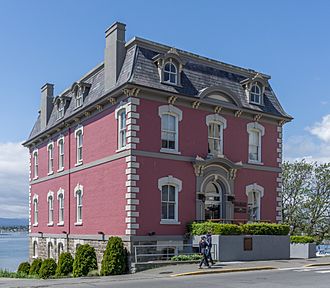Old Victoria Custom House facts for kids
Quick facts for kids Old Victoria Custom House |
|
|---|---|

Old Victoria Custom House in 2012
|
|
| General information | |
| Town or city | Victoria |
| Country | Canada |
| Coordinates | 48°25′28″N 123°22′14″W / 48.424359°N 123.3704865°W |
| Opened | 1875 |
| Height | |
| Architectural | Second Empire |
| Technical details | |
| Floor count | 3 |
| Design and construction | |
| Architect | Thomas Seaton Scott |
| Designations | Historic building |
The Old Victoria Custom House, also called the Malahat Building, is a special historic building in Victoria, Canada. It was finished in 1875. In 1987, it was officially named a historic building.
This three-storey building has a unique mansard roof. It looks out over Victoria's harbour. The building shows how important Victoria was as a trading city on Canada's West Coast long ago.
What is a Custom House?
A custom house is like a special office for a country's government. It's where officials collect taxes on goods coming into or leaving the country. These taxes are called "customs duties."
In the past, custom houses were very important for trade. They helped control what came in and out. This building played a big role in Victoria's early history.
Design and Architecture
The Old Victoria Custom House was designed by Thomas Seaton Scott. He was the first Chief Architect for Canada's Department of Public Works. The building shows a style called "Second Empire."
This style was popular for government buildings back then. The Custom House is a simpler example of this grand style. Its design fits Victoria's size at the time it was built.
The building has three floors. It features a distinctive mansard roof. This type of roof has four sides, each with two slopes. The lower slope is steeper than the upper one.
A Historic Landmark
The Old Victoria Custom House was named a historic building in 1987. This means it's recognized for its important past. It helps us remember Victoria's role in Canadian trade.
The Historic Sites and Monuments Board of Canada describes its importance. It stands as a reminder of a time when Victoria was a busy port. Ships from all over the world would arrive here.

